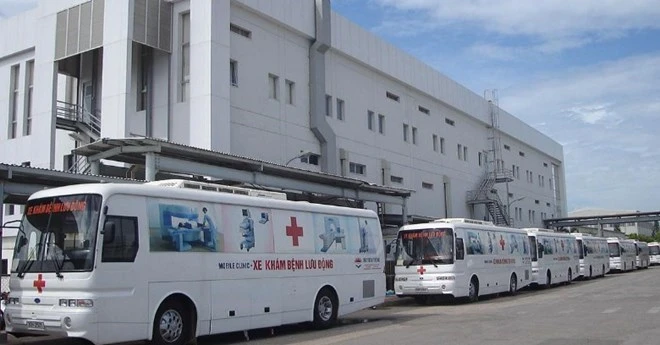
Single business model
JVC was established in 2001 with its main business being supply of medical equipment which involved trading, leasing, installing, repairing and maintaining such equipment. In the early days of operations, JVC charter capital was just VND 6 bn, and its work force of five personnel included a company head, an accountant and few technicians. In 2002, JVC became the exclusive official agent for medical equipment supply in Vietnam for Hitachi, a leading corporation in Japan that specialized in magnetic resonance (MRI), computerized tomography (CT), X-ray and ultrasound machines.
JVC pursued a single business model and by partnering with Hitachi, the company made huge breakthroughs the following years. Under the contract, JVC worked directly with Hitachi in Japan, undertaking all hospital orders and supplying customers with products by JVC. In this way, JVC was able to reduce costs and overheads, and negotiate the best pricing directly with Hitachi.
With its partnership with Hitachi as a successful model, JVC signed further cooperation deals with other global leading medical equipment companies such as Nemoto, Toray Medical, ELK, KINKY, Carestream Kodax, and Fuji. This was a glorious golden era for JVC. By now JVC had about 200 employees and known as a leading supplier in medical imaging equipment with a 40% market share in this field. JVC became known as the official distributor of medical equipment for about 50 firms, and an exclusive distributor for 20 firms.
Violation of business practices
JVC revenue and profits soared for many years, mainly due to its strong partnership with Hitachi. The company saw an average annual growth rate of about 30%, and an average gross profit margin of around 38%. In 2010, JVC switched to becoming a joint stock company and in November 2011 listed on HOSE at a closing price of VND 24,800 per share. After listing, JVC issued more shares to raise capital from VND 224 bn to VND 1,125 bn.
However, by 2015 many negative rumors afloat in the market caused JVC to lose 80% of its value in just three months, even dropping share price to only VND 2,000 per share. JVC business activities began to encounter difficulties because of violations committed by Mr. Le Van Huong, General Director and Chairman of Board of Directors. JVC plunge caused heavy losses for big investment funds such as Dragon Capital, Vietnam Equity Holding and Dream Incubator, while small investors too suffered huge losses.
Irrecoverable damage
In order to pull itself out of its present situation, JVC received support from Hitachi, its Japanese strategic partner. Hitachi handed over to JVC all distribution in the Southern market from March 2017. Thus, JVC was able to stabilize its business operations. JVC also received more support from its other partner Fuji, who offered distribution in the North. Banks such as BIDV, Techcombank, TPBank also granted back VND 150 bn credit limit to JVC, and its business results began to show a recovery, and profits began to soar again.
However, JVC was burdened with accumulated losses of almost VND 1,000 bn over the years. These losses were the result of past mistakes when JVC had faced trouble. JVC has been on alert since 15 December 2017, and undistributed profit after tax as of 31 March 2020 has been at negative at about VND 1,015 bn. Besides, JVC has not been able to pay dividends to shareholders, even though its business has been profiting. JVC now needs a plan to handle accumulated losses and receivable bad debts to clean up its financial situation in order for the recovery process to best benefit its shareholders.




















